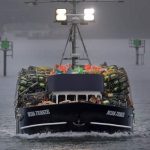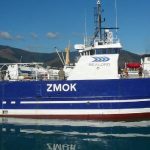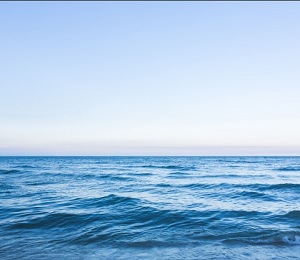Daily Archives: February 15, 2017
Op-ed: E-mails continue a troubling practice on fisheries panel
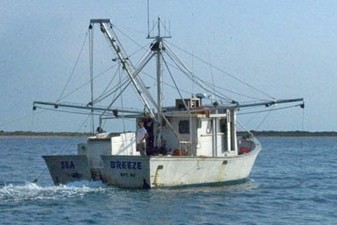 With a critical vote pending on a petition to limit shrimp trawling in state waters, a member of the North Carolina Marine Fisheries Commission made no secret of his position in an e-mail to a concerned chef from Charlotte. The e-mail was among several by Commissioner Chuck Laughridge to people who had submitted written comments on the petition, which supporters say is aimed at protecting fish species that are discarded as by-catch after they are hauled in by shrimp nets. Laughridge wrote the e-mails despite warnings from the commission’s lawyer about conducting business outside of public meetings and expressing opinions on pending issues before the fisheries panel has fully debated and voted on them. We at Outer Banks Catch are troubled by these continuing private communications. The commission is already under the cloud of a 2016 audit that cited several potential violations of open meetings laws in e-mail communications among its members. With the potentially devastating impact of limits to shrimp trawling on commercial watermen and consumers up and down the East Coast, the commission more than ever must be above-board. Continue reading the Op-ed here 22:38
With a critical vote pending on a petition to limit shrimp trawling in state waters, a member of the North Carolina Marine Fisheries Commission made no secret of his position in an e-mail to a concerned chef from Charlotte. The e-mail was among several by Commissioner Chuck Laughridge to people who had submitted written comments on the petition, which supporters say is aimed at protecting fish species that are discarded as by-catch after they are hauled in by shrimp nets. Laughridge wrote the e-mails despite warnings from the commission’s lawyer about conducting business outside of public meetings and expressing opinions on pending issues before the fisheries panel has fully debated and voted on them. We at Outer Banks Catch are troubled by these continuing private communications. The commission is already under the cloud of a 2016 audit that cited several potential violations of open meetings laws in e-mail communications among its members. With the potentially devastating impact of limits to shrimp trawling on commercial watermen and consumers up and down the East Coast, the commission more than ever must be above-board. Continue reading the Op-ed here 22:38
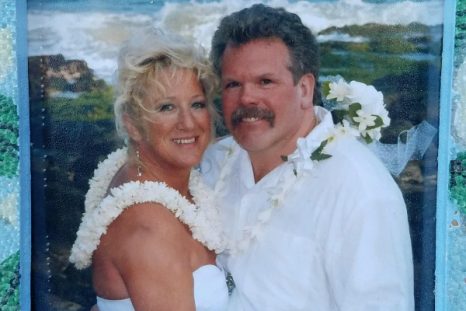
Please Donate to the Larry O’Grady Family Fund
Please help our Auntie Gail during this devastating tragedy. On February 11, 2017, Gail received a phone call that would forever change her life. Her beloved husband and best friend “Larry O” is missing at sea. On Saturday morning the fishing vessel ‘Destination’ sent an emergency distress signal to the Coast Guard. The Coast Guard announced they would search for the missing vessel and crew members for 3 days. With heavy hearts, the Coast Guard has suspended the search for the crew of the fishing vessel Destination. This fund will go to our Auntie Gail to ease the financial burden that this tragedy has left her with. Thoughts and prayers to the owner, his crew members and their families. Visit the Larry O’Grady Family Fund page, (click here) and please donate any amount you can.

Please donate to the Charles Glenn Jones Family Relief Fund
Saturday, February 11th the wife of Charles Glenn Jones received a phone call that no family member ever wants to receive. The vessel, FV Destination, that Charles was working upon, and had been for many years, was considered missing. As minutes rolled into hours, and hours felt like an eternity all signs are pointing to no possible chance of survival. Coastguard Crews and volunteers have been searching for nearly 24 hours, the ship has been officially declared sunk, and no crew members are expected to have survived. As in all walks of life, Rosalie and her family believed they had time. Time to plan, time to love, and time together. Rosalie and Charles had decided when he returned from this trip that they would finally get a life insurance policy on him, just in case, unfortunately reality had other plans and the Jones family is left enduring much pain and anguish. Continue reading (Click here) at the Charles Glenn Jones Family Relief Fund page, and please donate any amount you can. 18:22
Governor Brown’s interference pits her against commercial fisherman
 In an astoundingly ignorant and heavy-handed display of putting urban political correctness ahead of rural jobs, Gov. Kate Brown last week dictated that the citizen members of the Oregon Fish and Wildlife Commission reverse their January decision that gave commercial fishermen a minimally fair share of the Columbia River’s salmon allocation. Addressing commissioners as if they are misbehaving children, Brown told Chairman Michael Finley the commission majority’s acknowledgment of reality is “not acceptable” and that “I expect” the commission to acquiesce to her interpretation of the facts by April 3. Fish and Wildlife Commission members are in an infinitely better position to judge the ineffectiveness of salmon policies than is the governor. Read the Op-ed here 17:03
In an astoundingly ignorant and heavy-handed display of putting urban political correctness ahead of rural jobs, Gov. Kate Brown last week dictated that the citizen members of the Oregon Fish and Wildlife Commission reverse their January decision that gave commercial fishermen a minimally fair share of the Columbia River’s salmon allocation. Addressing commissioners as if they are misbehaving children, Brown told Chairman Michael Finley the commission majority’s acknowledgment of reality is “not acceptable” and that “I expect” the commission to acquiesce to her interpretation of the facts by April 3. Fish and Wildlife Commission members are in an infinitely better position to judge the ineffectiveness of salmon policies than is the governor. Read the Op-ed here 17:03
Creation of a new marine protection area off British Columbia upsets fishing industry
 Canada’s largest commercial fishermen’s union says the creation of a new marine protection area off British Columbia’s north coast will result in lost jobs and higher prices for seafood. The Canadian Independent Fish Harvesters’ Federation says the protection area goes too far in banning all fishing in several regions between Vancouver Island and the archipelago of Haida Gwaii. Jim McIsaac, the group’s Pacific vice-president, says the union supports safeguarding the region’s glass sponge reefs but he regrets that the Fisheries Department hasn’t followed the group’s advice after seven years of consultation. The federal government is expected to announce the new protection area on Thursday. Fisheries Minister Dominic LeBlanc says the federal government does not believe preserving the glass-sponge conservation area is an either/or proposition and that it’s possible to do so while balancing the interests of the commercial fishing industry. Read the rest here 16:18
Canada’s largest commercial fishermen’s union says the creation of a new marine protection area off British Columbia’s north coast will result in lost jobs and higher prices for seafood. The Canadian Independent Fish Harvesters’ Federation says the protection area goes too far in banning all fishing in several regions between Vancouver Island and the archipelago of Haida Gwaii. Jim McIsaac, the group’s Pacific vice-president, says the union supports safeguarding the region’s glass sponge reefs but he regrets that the Fisheries Department hasn’t followed the group’s advice after seven years of consultation. The federal government is expected to announce the new protection area on Thursday. Fisheries Minister Dominic LeBlanc says the federal government does not believe preserving the glass-sponge conservation area is an either/or proposition and that it’s possible to do so while balancing the interests of the commercial fishing industry. Read the rest here 16:18
Bully-net lobster fishermen can get new commercial status
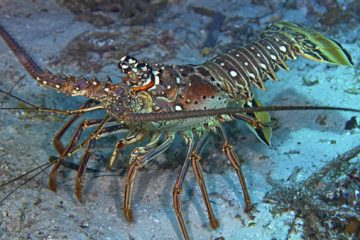 A new Florida commercial lobster license for bully-netters will come with a “Respectful Bully Netting” outreach campaign. Florida Fish and Wildlife Conservation Commission members on Feb. 8 approved creation of a new bully-net endorsement for people who have a commercial endorsement for lobster.“Conflicts between waterfront homeowners and bully-netters” was cited as one concern about expanding the commercial lobster industry to include the netting technique. The increased use of bully nets for commercial lobstering “allows opportunities for young or new fishers and preserves the culture of participation in the Keys commercial lobster fishery”. Continue reading the story here 14:45
A new Florida commercial lobster license for bully-netters will come with a “Respectful Bully Netting” outreach campaign. Florida Fish and Wildlife Conservation Commission members on Feb. 8 approved creation of a new bully-net endorsement for people who have a commercial endorsement for lobster.“Conflicts between waterfront homeowners and bully-netters” was cited as one concern about expanding the commercial lobster industry to include the netting technique. The increased use of bully nets for commercial lobstering “allows opportunities for young or new fishers and preserves the culture of participation in the Keys commercial lobster fishery”. Continue reading the story here 14:45
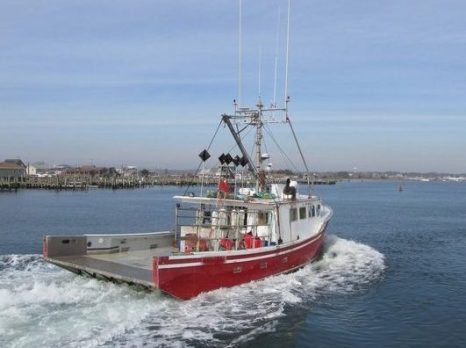
Athearn Marine Agency Boat of the Week: 44′ 11″ x 21′ Novi Lobster/Scallop, 350HP Mitsubishi, Permits Available
Specifications, information and 45 photo’s click here To see all the boats in this series, Click here 12:45

The Eli Seibold Destination Fund
Eli is the son of Darrik Seibold who is a crew member on board the Destination vessel that went missing in the Bering Sea Saturday. His family is devastated, the past few days have been unbearable for them and a heart breaking time for our community. So many people have asked how they can help during this very helpless time, so we have started a fund for Darrik’s son Eli. The fund will help ensure a brighter future for Eli, who will turn three this weekend without his father. By supporting Darrik’s son, we can help provide for his future now that his father is unable to do so. I would like to say thanks to all who have asked how to help Bill and Jan over the past few days, your messages have been forwarded to them. Click here for the Eli Seibold Destination Fund, and please give what you can. 12:12
Door-to-door shrimp salesmen busted shorting customers
 Most door-to-door shrimp purveyors volunteer to remove the heads from the crustaceans after a customer agrees to a sale. For many, that’s not just a nice thing to do. It’s so that the consumer can’t check the weight to see that he or she has been shorted. Complaints from customers about not getting what they paid for led to the bust of two door-to-door shrimp salesmen in Calcasieu Parish in the last week, according to the Louisiana Department of Wildlife and Fisheries. The department said its agents arrested Kenny Menard, 45, of Rayne, and Jessie Dupuis Jr., 43, of Lafayette, and charged them with theft by fraudulent sales, selling shrimp without a retail seafood license and failing to maintain records. Read the rest here 11:38
Most door-to-door shrimp purveyors volunteer to remove the heads from the crustaceans after a customer agrees to a sale. For many, that’s not just a nice thing to do. It’s so that the consumer can’t check the weight to see that he or she has been shorted. Complaints from customers about not getting what they paid for led to the bust of two door-to-door shrimp salesmen in Calcasieu Parish in the last week, according to the Louisiana Department of Wildlife and Fisheries. The department said its agents arrested Kenny Menard, 45, of Rayne, and Jessie Dupuis Jr., 43, of Lafayette, and charged them with theft by fraudulent sales, selling shrimp without a retail seafood license and failing to maintain records. Read the rest here 11:38
Study: Seismic Testing Disrupts Fish Behavior
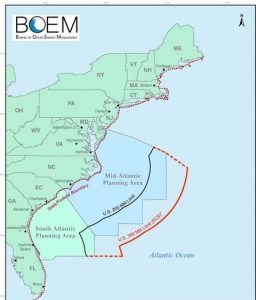 Almost anyone who’s thrown a hook in the water to catch a fish in a quiet atmosphere probably knows intuitively that loud noises spook them: you don’t scream at fish to bite, after all, you wait patiently. But intuition isn’t science, and seismic airguns don’t make just any loud noise, so when University of North Carolina Institute of Marine Sciences doctoral student Avery Paxton and some colleagues got the opportunity to do some real science on an issue that’s germane to the hot topic of oil and gas exploration by seismic surveys, they jumped at the chance. What they found, back in September 2014 when they did a study during a U.S. Geological Survey seismic mapping effort in the Atlantic Ocean off Beaufort Inlet, not only confirmed intuition, but surprised them in its degree: 78 percent of the fish on a reef near the seismic survey “went missing,” compared to counts at the same time the three previous days during the evening hours, the peak time for fish, such as snapper, grouper and angelfish, to gather there. Continue reading the article here 10:27
Almost anyone who’s thrown a hook in the water to catch a fish in a quiet atmosphere probably knows intuitively that loud noises spook them: you don’t scream at fish to bite, after all, you wait patiently. But intuition isn’t science, and seismic airguns don’t make just any loud noise, so when University of North Carolina Institute of Marine Sciences doctoral student Avery Paxton and some colleagues got the opportunity to do some real science on an issue that’s germane to the hot topic of oil and gas exploration by seismic surveys, they jumped at the chance. What they found, back in September 2014 when they did a study during a U.S. Geological Survey seismic mapping effort in the Atlantic Ocean off Beaufort Inlet, not only confirmed intuition, but surprised them in its degree: 78 percent of the fish on a reef near the seismic survey “went missing,” compared to counts at the same time the three previous days during the evening hours, the peak time for fish, such as snapper, grouper and angelfish, to gather there. Continue reading the article here 10:27
How sustainable seafood can harm coastal communities
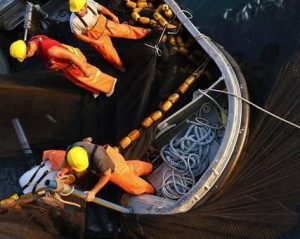 Kai Ryssdal: Tell me the story of how this book came to be. Lee van der Voo: Sure. Actually, I had just written a story about seafood and was in a bar with a bunch of writers loudly complaining about how I was never going to do it again. Somebody heard me and bet me, on the spot, one beer that they could get me to do it. And they started telling me about a new policy push to make seafood more sustainable in America and how it was starting to have some really significant downstream consequences for coastal communities and people who fish. Ryssdal: Long story short, you lost the beer. Van der Voo: Yeah, I lost that bet. It was worth it. Ryssdal: Do me favor and define a term for me, because it’s kind of at the root of this whole book, this idea of “catch share. Audio report, read the rest here 09:08
Kai Ryssdal: Tell me the story of how this book came to be. Lee van der Voo: Sure. Actually, I had just written a story about seafood and was in a bar with a bunch of writers loudly complaining about how I was never going to do it again. Somebody heard me and bet me, on the spot, one beer that they could get me to do it. And they started telling me about a new policy push to make seafood more sustainable in America and how it was starting to have some really significant downstream consequences for coastal communities and people who fish. Ryssdal: Long story short, you lost the beer. Van der Voo: Yeah, I lost that bet. It was worth it. Ryssdal: Do me favor and define a term for me, because it’s kind of at the root of this whole book, this idea of “catch share. Audio report, read the rest here 09:08
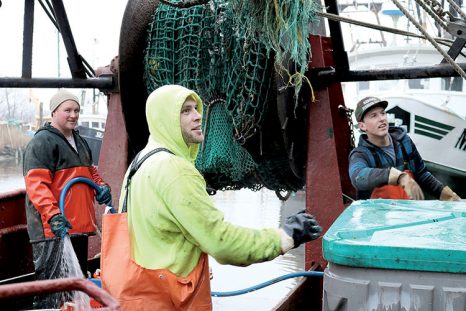
NJ Fluke Fishing Industry in Flux
After a decision made last week aimed at protecting the Atlantic Ocean’s primary cash fish, New Jersey anglers now believe their industry is in dire straits. The Atlantic States Marine Fisheries Commission (ASMFC), a federally regulated authority that oversees fishing management for the 15 states along the Atlantic Coast, has decided to increase regulations on summer flounder for 2017. “With what they’re proposing, it’s going to be the final nail in our coffin,” said Ron Santi, a head boat captain based out of Atlantic Highlands. “When looking at recreational and commercial fisheries on a whole, it seems as though for 20 to 30 years, we’ve been fishing at a higher level than the resources can sustain,” said Kirby Rootes-Murdy, a senior fishery management plan coordinator with ASMFC. Between recreational and commercial fishing, fluking generates nearly $2.5 billion for the state’s economy, according to the NJ Department of Environmental Protection. Continue reading the story here 08:00

































